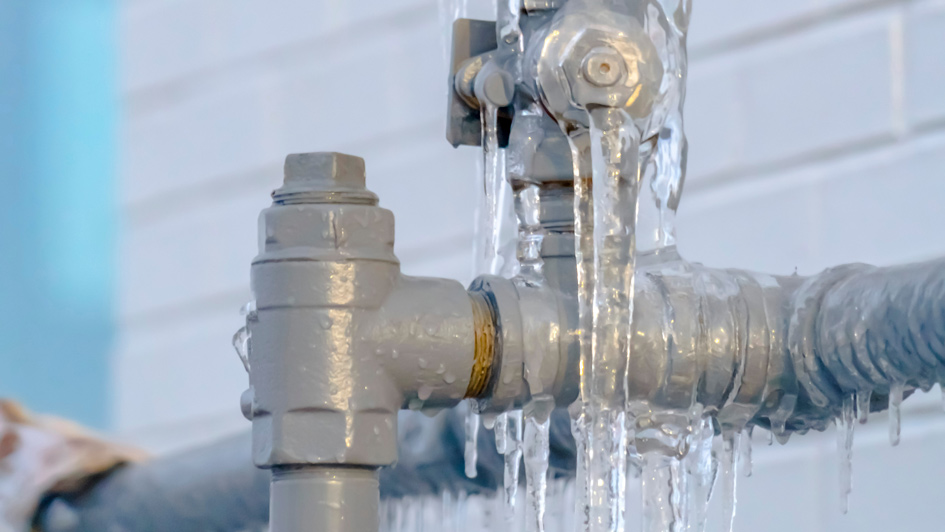
Snow-covered winter weather presents a great opportunity for a fun day sledding down the highest hill or snowball fights in the front yard. That being said, winter weather can be difficult on your home. Severely cold conditions can encourage the water lines in your house's plumbing system to freeze and burst, which may result in severe water damage and enduring negative effects.
Once your pipes are frozen, you should hire a plumber in West Jefferson to fix them. However, there’s several tasks you can attempt to stop this from happening – and even just a bit of prevention can go a long way.
What Pipes Are at Risk of Freezing
The pipes at the largest risk of freezing are uninsulated water lines. Common locations for uncovered pipes are in attic crawlspaces, near exterior walls, in the basement or even running beneath a modular home. Water lines that are not properly insulated are at the greatest risk.
How to Stop Pipes from Becoming Frozen in Your Home
Thoroughly insulating exposed water lines is a solid first step to keeping your pipes ice free. You’ll often have access to lots of these materials from the local plumbing company, and might also already have some somewhere in your home.
Be mindful not to wrap up other flammable insulation materials where they can be caught on fire. If you don’t feel confident insulating the pipes on your own, get in touch with your local plumbing services professional in West Jefferson to do the job.
If you do decide to insulate the pipes on your own, good insulation materials for pipes are:
- Wraps or roll insulation: Most plumbers, hardware stores and national retailers provide insulation – commonly fiberglass, foam wraps or pipe sleeves – that you can use to cover or fit around your pipes. They are sold in differing lengths and sizes to suit the needs of your home.
- Newspaper: To some degree, newspaper can be used as insulation. If the weather is getting colder and you aren’t able to add insulation soon enough, wrap uninsulated pipes in this.
- Towels or rags: If you don't have the chance to install insulation and don’t have any newspaper handy, wrapping particularly vulnerable pipes with towels or clean rags as a final effort may be just enough to keep the cold air away from the pipes.
Another preventative step you can attempt to keep pipes from becoming frozen is to seal any cracks that could permit cold air into your home. Pay close attention to window frames, which can allow in surprisingly intense drafts. Not only should this help to keep your pipes from freezing, but it will have the extra benefit of making your home more energy efficient.
Five More Ways to Keep Your Pipes from Freezing:
- Open the cabinet doors. Opening the cabinet doors underneath the sinks and other spaces of your home with pipes will allow more warm air from the rest of the room to reach the pipes.
- Letting water drip. Keeping the water flowing by letting your faucets trickle even just a little can help prevent frozen pipes.
- Open interior doors. By opening doors between rooms or hallways, your home can be heated more evenly. This is particularly important if there's a room that tends to be colder or hotter than the rest of the home.
- Close the garage door. The exception to the open doors tip is the garage door, which you should keep down – namely if your water lines are installed under the garage.
- Keep the heat flowing. Experts encourage setting the thermostat at a stable temperature and leaving it alone, rather than allowing it to get colder at night. Set it no lower than 55 degrees.
How to Keep Pipes from Freezing in an Unused Home
When you’re inside a house, it’s easier to know when something goes wrong. But what extra steps can you try to keep pipes from freezing in an unused home or vacation home when the consequences from a frozen pipe can remain unnoticed for days or even weeks?
As with the main residence, placing extra insulation around any exposed water lines, opening interior doors inside the home and winterizing the vacant home are the first steps to take.
Extra Steps to Stop Pipes from Freezing in an Empty Home:
- Leave the heat on. Even though you won't always be home, it’s best to leave the heat on – even if you adjust the thermostat down colder than you would if you were there. As with a primary house, experts recommend keeping the temperature at no lower than 55 degrees.
- Shut water off and drain the lines. If you’re going to be away for a long time or are winterizing a rustic cabin or cottage, switching the water off to the house and clearing the water out of the water lines is one way to stop pipes from freezing and bursting. Remember to flush the water out of your appliances, such as the hot water heater, and the toilets. Confirm you get all the water from the pipes. If you are not sure of how to drain the water from the pipes, or don’t feel comfortable performing it yourself, a plumber in West Jefferson will be glad to offer support.
